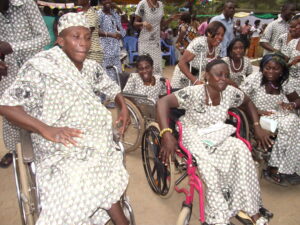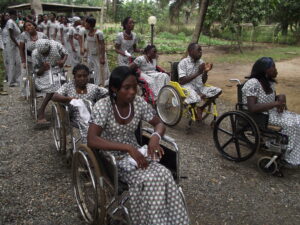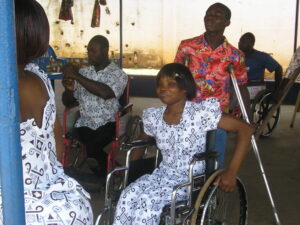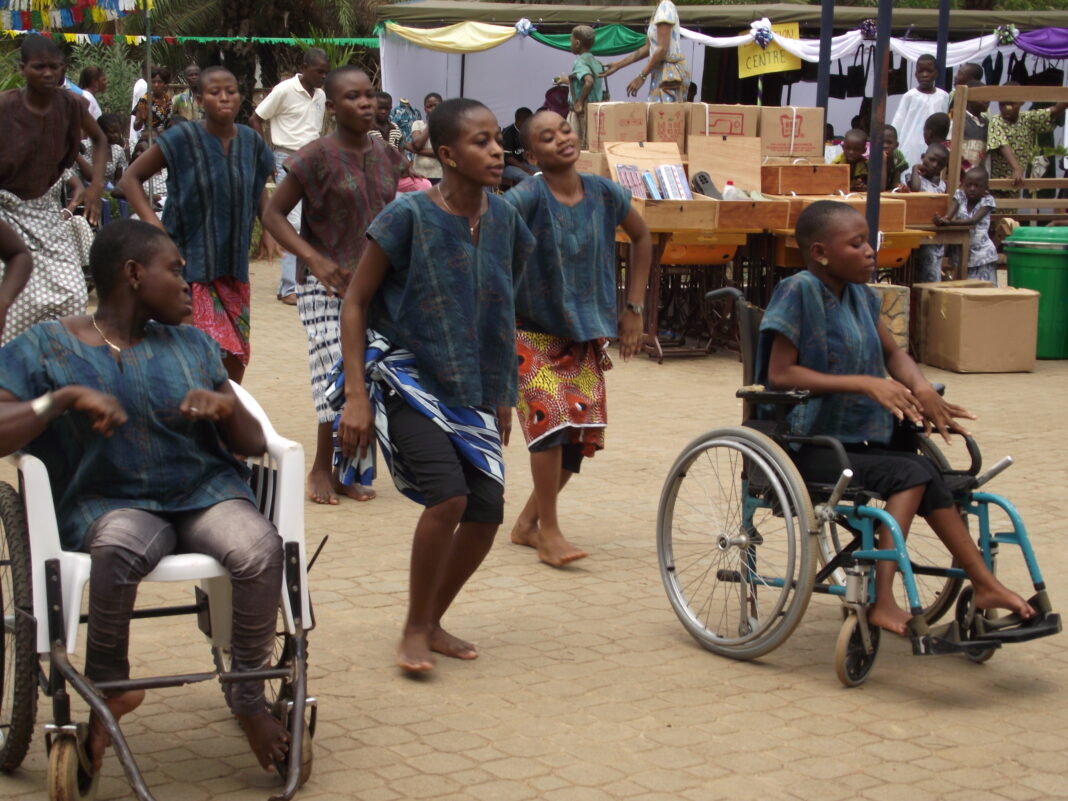The International Day of Persons with Disabilities falls on December 3 every year, aimed at promoting an understanding of disability issues and to mobilize support for the dignity, rights and well-being of persons with disabilities. It also seeks to create awareness of gains to be derived from integration of persons with disabilities in every aspect of political, social, economic and cultural life.
As the world prepares to celebrate this day on Friday, toll booth workers across the West African country of Ghana who are with disabilities had no option than to embark a protest on the cessation of the collection of tolls, which has rendered them redundant.
According to them, the directive from the Minister of Roads and Highways is having an adverse impact on their livelihoods. This follows a directive from the Roads Minister that the collection of road and bridge tolls at all locations nationwide should be halted effective from 12am on Thursday, November 18, 2021.
In September this year, Persons with Disabilities (PWDs) working with the Tolls and Routes Management Limited reportedly served notice to the Ghana Police Service of their intention to embark on a demonstration in Accra, to protest poor working conditions. The PWDs expressed their displeasure and called for instant improvement of work conditions of all PWDs at the various Tollbooths in Ghana.
Ghana’s Disability Law, 2006 (Act 715) was passed in 2006, aimed at ending the discrimination that faces people with disabilities but the ten-year moratorium given by the Act for old buildings to be renovated to disability-friendly status has indeed not been met.
It is worth noting that about ten percent of Ghana’s population are Persons with Disability (PWD). Although their rights are guaranteed both by Ghana’s Constitution and by International Conventions, in reality these provisions have offered them very little actual protection against discrimination.
People with disabilities in Ghana are often regarded as unproductive and incapable of contributing in a positive way to society. Instead of being viewed as assets, they are rather seen as constituting an economic burden on the family and the society at large, which leaves them in a vicious cycle of poverty.
But the assertion seems to be false as there are numerous PWDs, who have climbed the ladder to the pride of many Ghanaians, with special mentions of Ghana’s former Minister of Chieftaincy and Traditional Affairs, Dr. Henry Seidu Daanaa; Mr. Ivan Greenstreet, Presidential candidate of the Convention People’s party (CPP) in the 2020 elections; Mr. Ben Quarshie, retired Director of Finance at the Ministry of Employment and Social Welfare, who despite their disabilities, had shown that there was no glass ceiling for people with disability.
Mr. Quarshie, in spite of his state of stature, single handedly donates sewing machines to support the students of the St. Theresa School for the Physical challenged at Abor in the Volta Region, as way of encouraging them that disability is indeed not inability and to express the feeling that there is a lot PWDs can do to support each other and society at large.
Many Ghanaians including Parliamentarians who passed the Law have expressed disquiet on the continued observance of customary norms and practices that are inimical to the inclusion of persons with disability in society despite the passage of the Persons with Disability Act (Act 715). It is time that society breached the physical, socio-cultural, attitudinal and economic impediments that hindered the inclusion of people with disability in national developmental.
Contributing to mark the International Day of Persons with Disabilities in 2013, Ghana’s Members of Parliament held that society should be guided by the principle and conviction that the quality of life for people with disabilities will flow from useful collaborations with them, and urged a closer interface to guarantee meaningful opportunities that promote independence and self-sufficiency for them (People with Disabilities).
In Ghana over the years, disabled people’s Organisations have kept up the profile of the Disability Bill through annual celebrations such as International Disability Day and Human Rights Day.

In fact, at the International Disability Day celebrations in 2005, the Minister of Manpower Development and Employment confirmed the government’s commitment to disability issues, and declared the year 2006 as “Year of Action on Disability”.
In developing countries, there are rarely strong disability movements actively working to improve the living conditions for people living with disabilities. Disabled persons are often only weakly represented in civil society and Ghana is no exception.
To help protect their rights, the UN General Assembly adopted the Convention on the Rights of Persons with Disabilities in December 2006. The Convention and an additional optional Protocol are intended to promote, protect and ensure the full and equal enjoyment of all human rights and fundamental freedoms for all persons with disabilities.
Rights protected under the Act
The Persons with Disability Act itself contains more than 60 sections. The
sections discuss topics which range from the “Rights of Persons with Disability” to the Establishment and Functions of National Council on Persons with Disability” and the ′′Administrative and Financial Provisions”.
In addition to this, there are numerous international instruments which protect the rights of persons with disability. These laws are long, complex and could easily confuse the general population.
A multimillion question that could be asked is what rights of a person with disability are protected under the Act? The right to a family life and right to participate in social, creative or recreational activities; the prohibition of differential treatment for residential purposes, the right to the same living conditions as persons without disability when persons with disability are placed in special institutions; no exploitation, abuse, discrimination or disrespect to persons with disability, appropriate facilities when involved in court proceedings; and access to public places.
The Bill which was first drafted in 2002 and went through to 60 amendments during this four year period (2002-2006) finally went through with the blessing of both the Majority and Minority Members of Parliament.
The Bill aims to provide disabled people with: Accessibility to all public places, Equal employment opportunities, Transportation at free or reduced costs, free, general and specialist medical care, the creation of desks specifically for disabled people at employment centres and a National Council on Persons with Disability to oversee the implementation of national programmes aimed at disabled people.
The Act offers a legal framework to protect the rights of physically and mentally disabled persons in all areas of life, from education, training and employment to physical access and health care.
It is also intended to promote the creation of an environment that will advance the economic well-being of disabled people and enable them to function better. But ten years after passing the Bill into Law, one would ask how it had been beneficial to the beneficiaries.
Disability-friendly facilities
Parliament enacted the Persons with Disability Act 2006, (Act 715), which stipulates that within the period of ten years of passing of the law, that is by 2016, those who provide services at public places must make it easy for PWDs, by providing appropriate facilities that make the place accessible to and available for use by them.
Consequently, the Act directed that from 2006, any other public or private building, to which the public will have access to, should be built to be accessible to and available for use by a person with disability. Now, what that simply means is that, there should be a ramp purposely to facilitate access to the building by wheelchair users.
Section 6 of the Act, stipulates that “the owner or occupier of a place to which the public has access shall provide appropriate facilities that make the place accessible to and available for use by a Person with Disability.”

Section 7 of the Act also stipulates that “a person who provides service to the public shall put in place the necessary facilities that make the service available and accessible to a Person with Disability.” Section 39 under the Miscellaneous Provisions of the Act indicates that “a person or institution which organises a national, regional or district activity, shall as far as practicable ensure that facilities are made available for the participation in the activity by persons with disability.”
Apart from the Act making provisions on facilities and its accessibility, it also captures the requirement for persons with disability to have access to education; thereby tasking the Ministry of Education to provide the necessary facilities and equipment in learning institutions.
Also, if the building is a storey-building, it is required that there should also be an elevator to convey a person with disability to whichever floor. In terms of services, sign-language interpreter and Braille are also required. Interestingly, Churches in Ghana, have flouted this law in many instances since there are no sign-language interpreters seen there.
Many Ghanaians find it very sad that ten years into the passage of the PWD Act, the state was finding it difficult to implement the law. What would the state expect from other sections of society that should also provide those facilities to people with disability?
Fifteen years after the enacting of the Disability Law, it is unfortunate that Ghana still has the challenge of finding measures to remove all artificial barriers that prevented the physically challenged from accessing public building and facilities.
It is imperative for government and institutions work to together to provide ramps and elevators or lifts in public places to enable access by the physically challenged but we must also remember that it was not the responsibility of government alone to champion this cause but all Ghanaians.
The quality of a society is determined by how it treated and dealt with its most vulnerable citizens. It is unfortunate that in our Society, we feel ashamed of the physically disabled in our homes and hide them for fear of ridicule or mockery.
But if we bring our physically challenged children and relations into the open, this will enable us get the needed help for them in either righting their disability or of helping them gain enhancements for their residual capabilities.”
There was the need to respect the human rights of every person regardless of the individual’s status in life be they physically challenged or whole, and also need to acknowledge diversity, eradicate poverty and ensure that all people were fully included and they could actively participate in the development process and activities.
Personally, having associated myself with and participated in activities of PWDs, I think Parliamentarians who enacted the law have failed in ensuring that public buildings in Ghana are accessible to all including persons with disabilities by 2016.
Successive governments are believed to be committed to the promotion and protection of the rights of People Living with disability to live within their communities and ensure the equalization of opportunities but there is nothing to show.

It is imperative for government and institutions to work together to provide ramps and elevators or lifts in public places to enable access by the physically challenged. Ghanaians need to ensure equality by treating all subjects with rights who are capable of playing useful roles in society and contributing their quota towards our development.
All hands must be on deck to support the Ghana government in promoting the welfare of these institutions and others like them. The physically challenge in Ghana have indeed celebrated success, victory and triumph over all forms of societal discrimination and segregation on persons with disabilities.
Without any doubt, the physically challenge need to be supported to celebrate their contribution towards human development and her indebtedness to humanity irrespective of socio – economic, cultural, political affiliation, physical and psychological status.
Conclusion
The implementation of the Disability Act could be linked to the total development of the country and so the commitment must therefore go beyond platform statements on some special days.
Stakeholders are also urged to shed every bias and create the enabling conditions and opportunities for the fruitful integration of people with disability in society. In spite of interventions to improve the quality of life of people with disabilities, there was still a vast disparity between people with and without disabilities.
Majority of people with disabilities still faced various forms of discrimination and was more likely to live in poverty because they were unable to assert their rights. It is noted that there are still barriers and lack of opportunities to the inclusion of persons with disabilities in the mainstream society.
Stakeholders must to continue exploring and working to find solutions to challenges that PWDs face. Indeed government must show commitment by providing the budget to pursue programmes and projects to facilitate the process.
It is sad that many private and public institutions in the country are grossly disregarding some provisions in the Act, it is sadder to realise that, the Government, which many would expect should know better, would also decide to disregard the interest of persons with disability, while putting up the promised 200 Community Senior High Schools.
It is time the appropriate authorities and the Law Enforcement Agencies ensure that, the Persons with Disability Act, 2006 (Act 715) is enforced, otherwise as the witty saying goes, “A law without enforcement is just an advice.”



